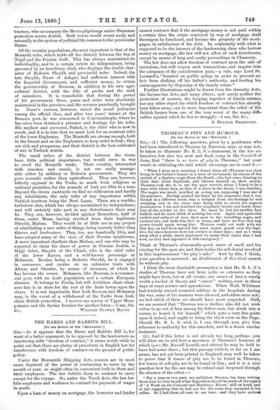THE HARES AND RABBITS BILL.
(TO THE EDITOR OF THZ “SrEcrAzon.-J
:Sia,—As it appears that the Hares and Rabbits Bill is, for want of a better argument, to be opposed by the landowners as interfering with "freedom of contract," it seems worth while to point out that there are plenty of precedents in English law for interference with freedom of contract on the ground of public policy.
Under the Mercantile Shipping Acts, seamen are in most vases deprived of the power of contracting to serve by the month or year, as might often be convenient both to them and their employers. The law forbids them to contract to serve -except for the voyage. So, under the Truck Acts, the law for- -bids employers and workmen to contract for payment of wages in goods.
-Upon a loan of money on mortgage, the borrower and lender cannot contract that if the mortgage-money is not paid within a certain time the estate conveyed by way of mortgage shall thereupon be foreclosed, and become the property of the mort- gagee, in satisfaction of his debt. In conformity with what is supposed to be the interest of the landowning class who borrow money on mortgage, the law will not allow of such foreclosure, except by means of long and costly proceedings in Chancery.
The law does not allow freedom of contract upon the sale of reversions, but will reopen such transactions, and inquire into the adequacy of the consideration paid,—a rule, says Lord St. Leonard's, "founded on public policy, in order to prevent an. heir from shaking off his father's authority, and feeding his extravagancies by disposing of the family estate."
Further illustrations might be drawn from the Annuity Acts, the Income-tax Acts, and many others; and surely neither the protection of seamen, the keeping together of family estates, nor any other object for which freedom of contract has already been taken away, can be more important than the relief of the British farmer from one of the very worst of the many diffi- culties against which he has to struggle.—I am, Sir, &c.,
A RETIRED BARRISTER.


































 Previous page
Previous page